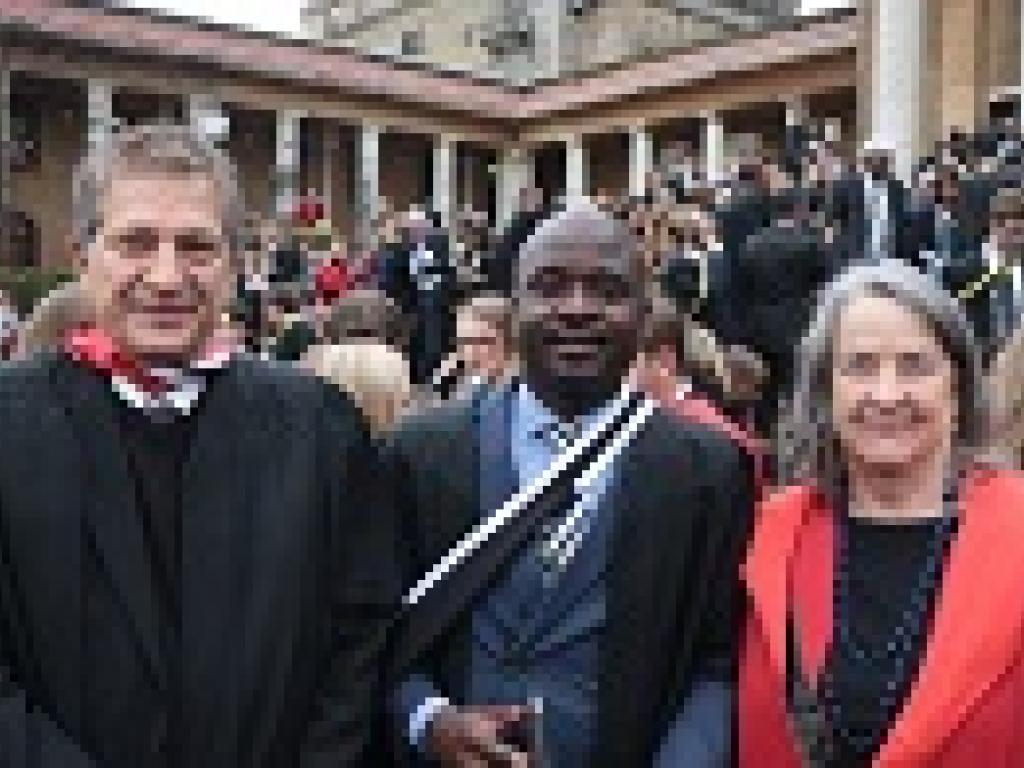Inaugural MPhil graduates have key role to play in shaping Africa’s future

It was a cold and rainy day at UCT, but nothing was going to dampen the enthusiasm of the group of inaugural graduates from the UCT Graduate School of Development Policy and Practice (GSDPP) who had gathered for a celebratory lunch after their graduation ceremony.
Saarah Salie, Takalani Rathiyaya, Quinton Mageza, Lucas Malambe (all from South Africa), Maybin Nsupila (Zambia), Percy Makombe and Rwakurumbira Munyaradzi (both from Zimbabwe) are the first seven to graduate from the GSDPP with an MPhil degree in Development Policy and Practice. The Master’s in Philosophy degree is now in it’s third year, with plenty more graduates in the pipeline.
Alan Hirsch and Brian Levy, director and academic director of the GSDPP respectively, were just as fired up about having reached this milestone as their students.
“What a great day,” an enthusiastic Brian Levy said to the graduates via skype. “We have been the pioneers together and we should be pleased at what we are building. There is huge amount of work that we still have to do together, so this is just the beginning.”
The GSDPP’s two-year, part-time MPhil programme is aimed at senior officials from across Africa and offers students a multi-disciplinary degree with a balance of theoretical and practical skills. Hirsch said that the aim of the MPhil, in common with all programmes at the school, is to build a network of skilled and skilful, committed reformers working in Africa.
“We think our network can make a contribution to trying to sustain the progress that Africa has made in the last 20 years and building foundations for taking it forward. And we hope and expect that our network of public entrepreneurs makes a difference,” he said.
“Africa has gone through an incredible period of relatively rapid growth in many, not all countries, but currently is facing low commodity prices and rising levels of debt. The question that many people are asking is: Are we going to go through the same experience that Africa had in the 1980s and the 1990s, the so-called lost decades, when commodity prices collapsed and governance deteriorated? Or, are we going to sail through this temporary crisis and be able to build on the foundations of the 20 years of growth that we have had up until now? And that depends on you.”
The newly minted MPhils seem to be up to the challenge. They say that the programme has made them think differently and given them new perspectives thanks to cross-cultural, cross-national and multi-disciplinary exposure. “It’s not just development studies,” says Rwakurumbira Munyaradzi, Director for Adaptive Path Consultants P/L, “it’s about policy development, it’s practical, experiential learning.”
Saarah Salie, Analyst in the Department of the Premier, Western Cape Government, to agreement from the others, indicated that it has been hard work and long hours – but that she would not hesitate to the take the degree again and would recommend it to others. Percy Makombe said the value of the programme was so obvious that his boss has joined one the subsequent groups of Master’s students. Makombe, who is the Programme Manager, Natural Resource Governance at the Open Society Institute for Southern Africa, also mentions the usefulness of the leadership elements of the programme that gave him a chance to question and improve his leadership style.
Listening to the graduates, it’s obvious that the learning with and from peers from the public and private sector from across Africa has been extremely valuable. “We were able to draw both from our unique situations and common challenges,” said Munyaradzi. And Makombe added that they will continue to consult one another in future when they are back in their respective work places. The graduates will also have the continued GSDPP’s support. “Keep in touch with us,” Hirsch told them during his address at the lunch and then quickly added “ – don’t worry, we’ll keep in touch with you”, to laughter from the group.
Hirsch said that he and the staff at the GSDPP are extraordinarily proud of their first crop of graduates. “When we started the masters programme we knew we needed to get the best group of people we could for the first class. You are the cream of the cream – you have got the ability and the commitment, so well done!”
That the future is in the hands of these highly educated and able new MPhils was also the tenor of the address given by Professor Francis Wilson at the graduation ceremony earlier in the day. Earning their Master’s degree just days ahead of the 40th anniversary of the Soweto Youth protests that demanded equal education for all South Africans, Wilson urged the graduates to honour the sacrifice made by the 1976 generation by implementing policies and practices to overcome poverty and inequality. That these reforms are overdue is one of the balls that the RhodesMustFall movement has put squarely in the academic court. Wilson points to the one common factor underlying successful change in Southern Africa – the quality of leadership.
“You are now the best educated members of a new generation who will take our country [and this continent] into the future,” he told the graduates. “There is need for a radical creative vision beyond the gods that have failed both on the left and the right ... It is your task to forge that new vision, not least in Southern Africa, and to bring it about.”
The GSDPP is in the process of recruiting the fourth cohort of MPhil students; applications close on the 5th of September 2016. For more information contact Elvina Moosa, elvina.moosa@uct.ac.za
